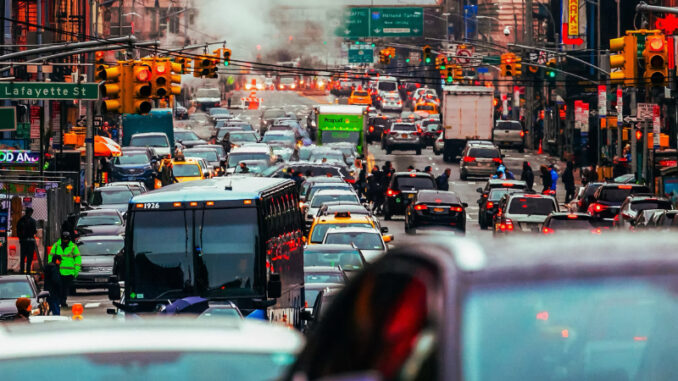
PASCACK VALLEY—Happy New Year, commuters: It’s time to update your E-ZPass. New York City’s congestion pricing plan launched Sunday, Jan. 5, bringing with it new tolls for vehicles entering Manhattan below 60th Street.
The toll, set at $9 during peak hours for most passenger vehicles, will increase to $12 in 2028 and $15 in 2031. The plan, known as the Congestion Pricing Program, aims to reduce traffic, improve air quality, and generate funding for public transit, but it has sparked controversy, especially among New Jersey leaders and commuters.
What You Need to Know
- When and Where: The toll applies to vehicles entering Manhattan below 60th Street.
- Rates: Passenger cars are charged $9 on weekdays (5 a.m.–9 p.m.) and weekends (9 a.m.–9 p.m.), with a reduced toll of $2.25 during off-peak hours.
- Exemptions: Emergency vehicles, government-owned vehicles, and certain commuter and transit buses are exempt.
- Excluded Routes: Drivers using the West Side Highway, FDR Drive, or Hugh L. Carey Tunnel without entering the toll zone are not charged.
- Bridge Tolls: Drivers crossing the George Washington Bridge pay the congestion toll only if they continue into the Congestion Relief Zone. E-ZPass drivers using the Holland or Lincoln tunnels during peak hours receive a $3 credit.
- Discounts and Assistance Programs: Low-Income Discount Plan (LIDP): Drivers earning under $50,000 annually or enrolled in qualifying government programs can apply for a 50% discount after 10 trips per calendar month.
- Individual Disability Exemption Plan (IDEP): Exemptions apply for vehicles registered to individuals with disabilities or their caregivers.
- Both programs require an E-ZPass account and an online application. Details are available on the Metropolitan Transportation Authority (MTA) website.
Proponents Tout Benefits
The MTA, which spearheaded the initiative, says the program, which also can bill by mail, benefits everyone. According to its website:
- Congestion pricing will reduce traffic, improve air quality, and make New York safer and more livable.
- Drivers will benefit from faster trips due to reduced traffic.
- Public transit riders will see faster bus and paratransit trips and critical improvements to subway and commuter rail systems.
- Pedestrians and cyclists will enjoy safer, quieter streets.
New Jersey Pushback
Fifth District Rep. Josh Gottheimer and Bergen County Executive Jim Tedesco remain staunch opponents of the plan. Both sought a temporary injunction late Friday, but a judge declined, and a federal appeals court on Saturday refused to intervene.
Gottheimer criticized the program as harmful to New Jersey families, saying in a Jan. 5 statement, “New York is barreling ahead with their Congestion Tax scheme without any concrete plan to mitigate the cancer-causing smog the Congestion Tax will force Jersey children and families to breathe in every day.
“It’s insane to me that at a time when hardworking families are struggling with higher costs, the MTA is literally celebrating whacking New Jersey and New York families with a new, regressive Congestion Tax.”
Tedesco voiced similar concerns, calling the plan “flawed” and citing its potential environmental and economic impacts on Bergen County.
“I am deeply disappointed that the Court has allowed the flawed congestion pricing plan to move forward, disregarding the severe environmental, public safety, and economic impacts it will impose on Bergen County residents,” he said.
“With Bridgegate-esque gridlock now expected daily in eastern Bergen County, a region without commuter rail service, Bergen County must see immediate funding designated to enhance its public transportation system, starting with the long-overdue NJ Transit extension of the Hudson Light Rail,” Tedesco said.
Local Perspectives
Westwood Mayor Ray Arroyo, a commuter and informed observer of transit issues, offered a blistering critique of the program, calling it “the foreseeable response to the coalescing negative impacts of dysfunctional public policies.”
“In 2023, the MTA lost $700,000,000 to fare evasion, because the state fails to arrest and prosecute violators. In NYC, almost 50% of bus riders fail to pay the fare,” he said. “Instead, the MTA will spend up to $1,000,000 on a behavioral psych study to better understand why riders aren’t paying their fare. With ‘investments’ like that, no wonder the agency is going broke.”
Arroyo continued, “Ride-share services like Uber and Lyft have not taken private vehicles off the road; they’ve just added to the fleet of cars-for-hire that are adding to the congestion.”
He also challenged the idea that urbanizing residential densities along train lines will reduce air pollution, calling the premise flawed.
Arroyo said he may personally avoid the toll due to his project locations north of the congestion zone but added, “Every business that is impacted financially by this added tax will surely roll it into their billing, further inflating the already inflated prices that emerged post-pandemic.”
Arroyo added with a rhetorical flourish, “Congestion pricing is truly a sin tax on the innocent, levied by the sinners.”
Looking Ahead
The Murphy administration argues the toll will increase congestion and pollution in New Jersey, a claim echoed by critics on both sides of the Hudson. President-elect Donald Trump, a vocal opponent, has promised to repeal congestion pricing during his first week in office.
